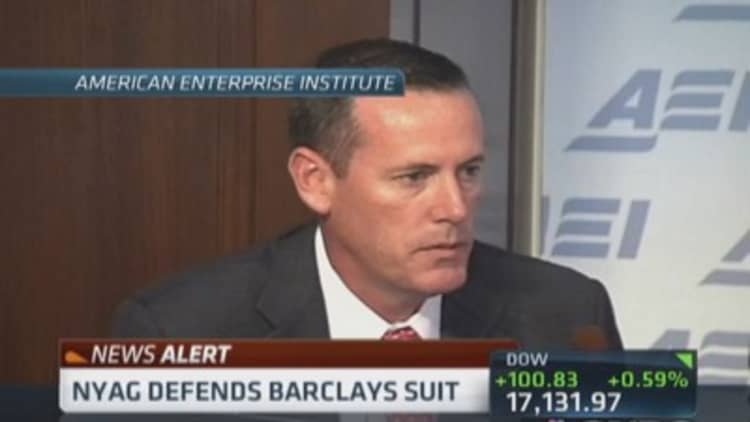
In court documents filed Tuesday evening in state Supreme Court, New York Attorney General Eric Schneiderman defended a controversial lawsuit against the British bank Barclays PLC over its electronic trading business, opposing its motion to dismiss the case.
Schneiderman also reasserted allegations that Barclays employees misled clients about their exposure to high-speed and potentially predatory market participants.
"Barclays boldly—and wrongly—asserts that it 'never promised' that 'it would bar aggressive traders' from its dark pool," Schneiderman states in a memorandum filed in response to Barclays' late-July motion to dismiss the original case.
Nonetheless, the filing adds, "Barclays' Head of Electronic Trading states in a presentation available to clients and the investing public that 'where we see suspect activity, we've gone out proactively to sit down with clients and we've actually shut them off from the firm.'"
Read More 'Zoning' plan takes aim at high-speed trading
The commentary Schneiderman referenced was made by Bill White at a 2012 American Enterprise Institute conference on the topic of stock-market structure. White was then the overseer of Barclays' electronic stock-trading operations. Using it as an example of what it deems hypocrisy at the firm, the attorney general states in Tuesday's filing that Barclays "sought to make investors believe that its brokerage services and dark pools," or privately managed, computerized stock-trading platforms, "were operated to offer meaningful protection from predatory or aggressive high frequency trading, when in truth, Barclays was exposing its clients" to those very forces.
Barclays has denied the allegations Schneiderman has made.
"As stated in our motion to dismiss, the New York Attorney General's complaint is based on clear and substantial factual errors. Barclays works closely with its regulators in all jurisdictions, and we continue to cooperate with the New York Attorney General. However, we do not believe that this suit is justified, and we have a duty to our shareholders, clients and colleagues to defend our position. We will respond to the New York Attorney General's opposition in due course," Barclays told CNBC via e-mail.
In a July 24 response to Schneiderman's original securities-fraud suit, which had been filed a month earlier, the bank argued that the complaint should be dismissed, given, among other things, that the issues were outside the scope of New York State's Martin Act, a broad investor-protection measure that, it argued, covered only securities and not more general conduct, and that state lawyers had mischaracterized the bank's practices.
Read MoreBarclays picks Aviva's McFarlane as new chairman
Even so, Barclays relieved White of his day-to-day duties just days after the attorney general's suit was filed, allowing him to focus solely on the lawsuit.
—By CNBC's Kate Kelly


